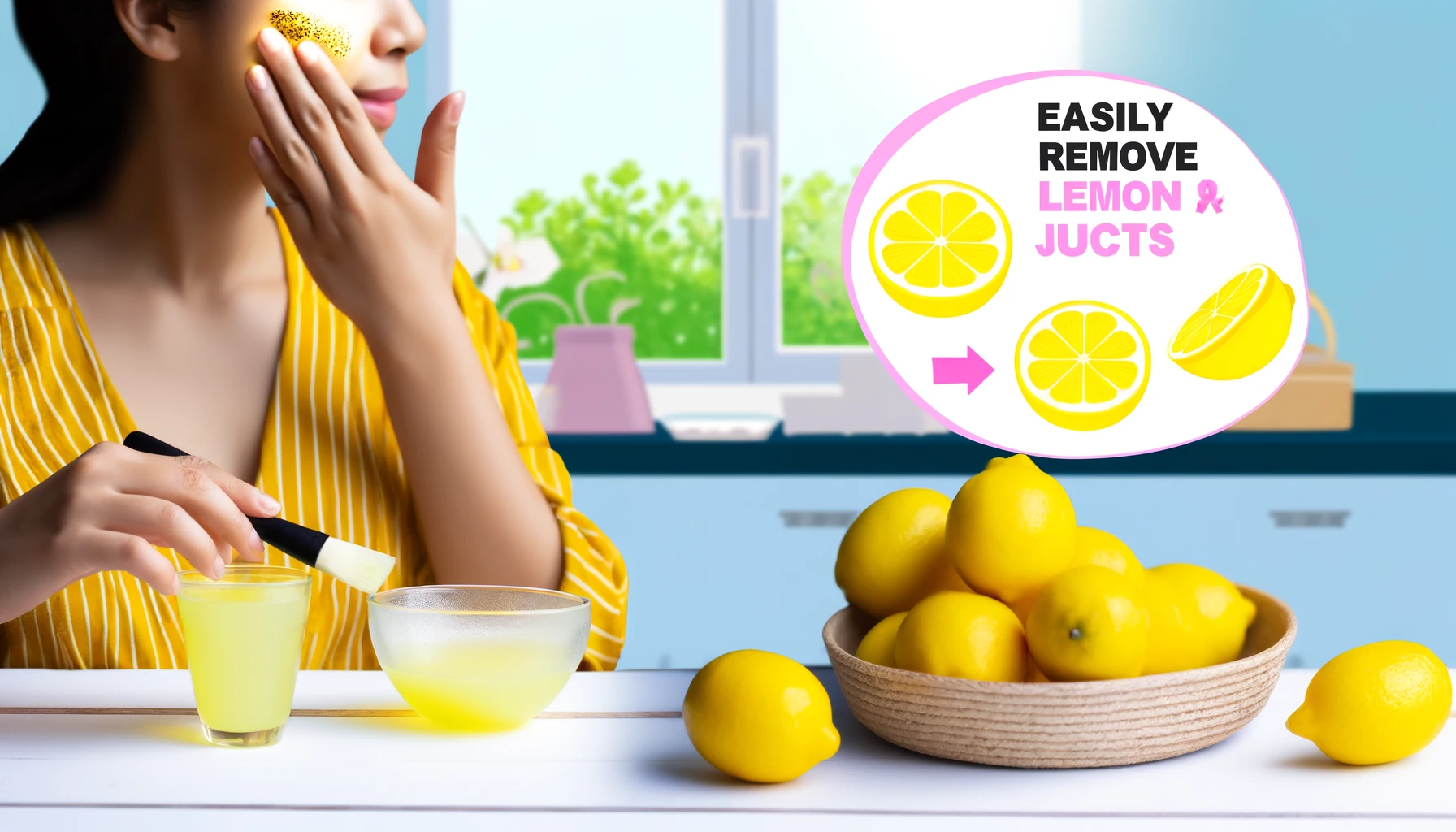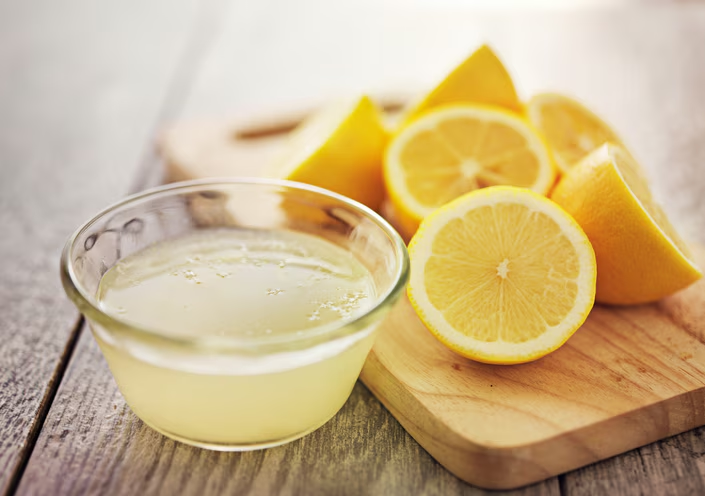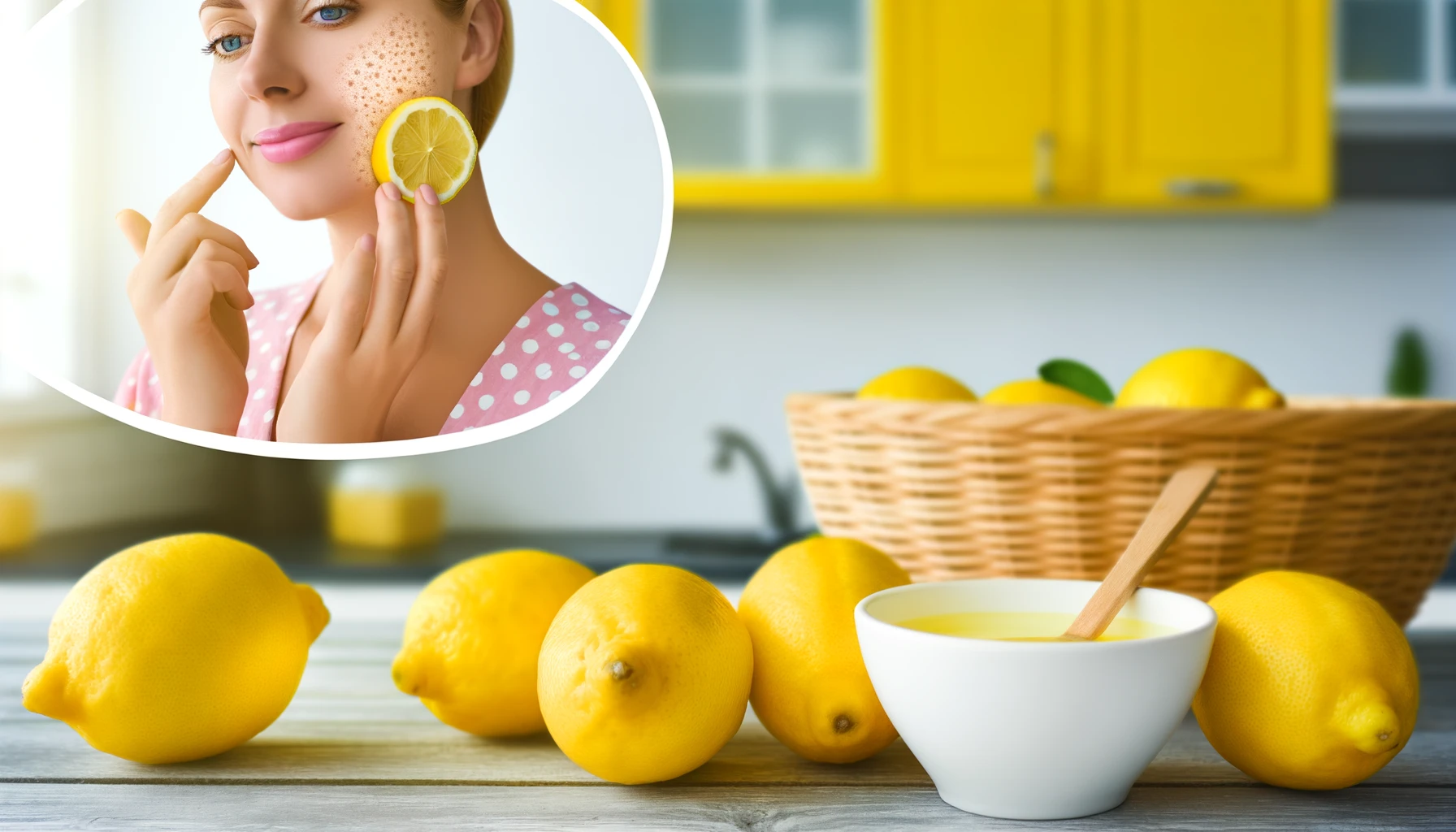
The world’s discovery of natural remedies for skin care offers a gentle but effective alternative to commercial products, which often contain harsh chemicals. Among these natural solutions, lemon juice stands out due to its skin whitening properties. This section discusses why and how ingredients derived from nature, especially lemon juice, can be integrated into daily skin care routines to manage common problems like dark spots and hyperpigmentation . Emphasizing the benefits of natural ingredients not only helps in getting glowing skin but also promotes a healthy approach to skin care.
Benefits of natural ingredients
Natural ingredients have been used in skin care for centuries for their healing and restorative properties. Ingredients like lemon juice , aloe vera, and turmeric are celebrated for their ability to improve skin tone, texture, and overall health without the risks associated with synthetic additives. This subsection explores the various benefits of incorporating natural ingredients into your skin care regimen, focusing on their accessibility, cost-effectiveness, and compatibility with different skin types.
Why does lemon juice work?
Lemon juice is famous for its rich vitamin C content and natural acids that contribute to skin whitening effects. These ingredients help reduce melanin production, which is the primary cause of dark spots. This subsection will explore the scientific mechanism behind the effectiveness of lemon juice in improving skin complexion, giving a deeper understanding of how regular use can enhance the beauty of the skin. The focus will be on practical insights into how lemon juice can be used safely and effectively as part of a holistic skin care solution.
The science behind lemon juice and skin whitening
Lemon juice is often touted as a natural remedy to lighten dark spots and improve overall skin complexion. But what is the science behind it ? The main active ingredient in lemon juice is ascorbic acid , commonly known as vitamin C. Vitamin C is a powerful antioxidant that helps reduce melanin production. Melanin is the pigment responsible for our skin color; Overproduction can lead to dark spots and uneven skin tone. Additionally, lemon juice has a low pH, making it a natural bleaching agent that can help lighten the skin when applied to the skin.
Despite its benefits, the effectiveness of lemon juice may vary between individuals. Factors like skin type, severity of dark spots and how the lemon juice is applied play an important role in the results. Scientific studies have shown that while vitamin C can be effective in improving skin complexion, its concentration and duration of exposure are important to ensure safety and efficacy. Therefore, it is important to understand these aspects for anyone considering lemon juice as a skin lightening treatment option.

Chemical properties of lemon juice
Lemon juice contains several chemical compounds that contribute to its skin whitening abilities. In addition to ascorbic acid , lemon is rich in citric acid , which exfoliates the top layers of the skin and removes dead skin cells, making the skin appear brighter and more even. This natural exfoliation process is important to prevent melanin build-up in certain spots. Additionally, the natural astringent properties of lemon help tighten pores and can reduce the overall appearance of dark spots.
It’s important to note that the high acidity in lemon juice can also make the skin more sensitive to sunlight, increasing the risk of sunburn. This sensitivity underlines the importance of using sunscreen when treating skin with lemon or any other citrus products. Balanced use of lemon juice, taking into account its chemical properties, can be a beneficial part of a skin care regimen if applied carefully and combined with proper skin protection.
Effect of pH level on skin
It is important to understand the pH level of lemon juice when using it for skin care . Typically, the pH of lemon juice is between 2 and 3, which is highly acidic compared to the skin’s natural pH, usually between 4.5 and 5.5. This anomaly can disrupt the skin’s acid mantle, which acts as a barrier against pathogens and regulates moisture levels. Prolonged use of highly acidic substances like lemon juice without proper care can cause irritation, dryness and even damage to the skin.
To minimize these effects, it is recommended to dilute the lemon juice with water or a carrier oil and monitor the skin’s reaction over time. A patch test is always recommended before incorporating acidic treatments into your skin care routine. Additionally, restoring the skin’s pH balance after treatment with soothing ingredients such as aloe vera can help keep the skin healthy, while lemon juice can be used for its lightening effects.
Step-by-Step Guide: Use Lemon Juice to Treat Dark Spots
This section provides a detailed step-by-step guide on how to effectively use lemon juice to treat dark spots . Dark spots, also known as hyperpigmentation, can be a frustrating problem for many people, and lemon juice is a natural remedy with skin whitening properties due to its high vitamin C content . This guide will help to ensure that users apply this treatment safely and effectively, achieving maximum benefit while minimizing any potential skin irritation.
Preparing Lemon Juice Solution
Start by preparing the lemon juice solution properly to ensure its efficacy. Freshly squeeze the juice of a ripe lemon into a clean bowl. To this, add equal amount of water to reduce the acidity, which can be harsh on the skin when used in its concentrated form. For sensitive skin types, it is recommended to increase the proportion of water or add a few drops of honey to the mixture for its soothing effect and additional skin benefits .
Application Process
Apply the lemon juice mixture to the dark spots using a clean cotton pad or Q-tip for more precise application. Apply the solution gently to the affected areas, making sure not to rub as this may irritate the skin. Leave the mixture on the skin for about 10-15 minutes. Meanwhile, the natural acids of the lemon will work to gently remove dead skin cells and lighten hyperpigmentation. After the waiting period, wash off the solution with lukewarm water and pat dry with a soft towel.
Post Application Care
After treating your skin with lemon juice, it ‘s important to apply a moisturizer to soothe the area and restore hydration. Since lemon juice can make your skin more sensitive to UV rays, don’t forget to apply a broad-spectrum sunscreen with adequate SPF. This is important to protect the skin and prevent the spots from becoming darker. Regular use of this treatment may show improvement over time, but consistency and patience are important.
Precautions and skin protection when using citrus products
Citrus fruits like lemon are popular for their health benefits and beauty uses, especially in lightening dark spots on the skin . However, it is important to use them with caution due to potential side effects. Citrus juices, especially lemon juice, contain high levels of citric acid , which can be too harsh for some skin types, causing irritation , redness , and sensitivity to sunlight . To safely incorporate these ingredients into your skin care routine, it is important to understand the risks and how to minimize them.
Understanding Citric Acid and Skin Sensitivity
While the citric acid in lemon juice can help exfoliate the skin and lighten dark spots, its high acidity can disrupt the skin’s natural pH balance . This disruption can lead to skin barrier damage , making the skin more vulnerable to infection and environmental damage . Before applying lemon juice to your skin, it is recommended to do a patch test to check for adverse reactions and to make sure that your skin can tolerate the acidity without negative effects.
Safe Application and Sun Exposure Considerations
When using lemon juice to treat skin, it is paramount to apply it correctly. Always dilute pure lemon juice with water or a carrier oil to reduce its potency. Limit application to targeted areas and avoid using it on open wounds or very sensitive areas like near the eyes . One should be careful of sunlight after applying lemon juice . Citric acid can make the skin extra sensitive to ultraviolet (UV) rays, increasing the risk of sunburn and skin damage . Always apply a broad-spectrum sunscreen and, ideally, limit sun exposure during peak hours after treatment to protect your skin.

Alternative Natural Ingredients to Reduce Hyperpigmentation
In the quest to achieve clearer and more even skin tone, it is essential to explore various natural ingredients other than lemon juice that can reduce hyperpigmentation. While lemon juice is known for its bleaching properties , other natural ingredients also provide safe and effective solutions to dark spots and uneven skin tone. This section highlights some of the most effective alternative ingredients that can be easily incorporated into your skin care routine.
aloe vera
Aloe vera is renowned for its soothing and healing properties, making it an excellent choice for skin care. It contains aloesin , a compound that inhibits the production of melanin in the skin, thereby helping treat hyperpigmentation. Using aloe vera gel directly from the plant or in processed form can gradually reduce dark spots and improve the overall health of the skin. For optimal results apply the gel on the affected area and leave it overnight as part of your daily skin care routine.
vitamin C
Vitamin C is a powerful antioxidant that not only fights free radicals but also plays an important role in making the skin glow. It inhibits the enzyme tyrosinase , which is responsible for melanin production. Regular use of vitamin C serum or natural sources like orange and grapefruit extracts can lighten dark spots to a great extent and contribute to a glowing complexion. For best results, include vitamin C in your morning skin care routine to protect against environmental damage throughout the day.
licorice extract
Known for its skin-lightening properties, licorice extract contains an active compound called glabridin . Glabridin helps to disperse and remove melanin and melanin precursors, which can reduce dark spots and provide an overall brightening of the complexion. Apply skin care products containing licorice extract consistently on the affected areas to see noticeable improvements in hyperpigmentation and skin tone.
DIY Skin Care Recipes Incorporating Lemon Juice
The use of lemon juice in DIY skin care routines is celebrated for its natural glow and ability to lighten dark spots. This section highlights various home remedies that harness the power of this citrus fruit to enhance the glow and texture of the skin. Lemon juice not only provides a natural alternative to commercial skin brightening products, but it ‘s also rich in vitamin C , which is important for promoting a glowing, even skin tone.
Lemon Juice and Honey Mask
Lemon juice and honey mask is one of the simplest yet effective recipes . Honey acts as a natural moisturizer and antibacterial agent, making it an excellent companion to lemon juice for skin care. To prepare this mask, mix one tablespoon of organic honey with two tablespoons of fresh lemon juice. Apply the mixture to the face, avoiding the eye area, and let it sit for about 20 minutes before washing off with warm water. This mask can not only help in reducing dark spots but also make the skin soft and glowing.
Lemon and Yogurt Exfoliating Cream
For those looking for gentle exfoliation and skin whitening effects, the Lemon and Yogurt Exfoliating Cream is ideal. Curd is rich in lactic acid, which helps in reducing pigmentation and softening rough skin. Mix one teaspoon of lemon juice with two tablespoons of plain yogurt and one teaspoon of oatmeal. The oatmeal provides a gentle scrub that removes dead skin while the curd and lemon work to clear and brighten the complexion. Apply this creamy mixture in gentle circular motions and let it sit for 15-20 minutes before washing off with cold water.
lemon juice toner
Lemon juice toner can be a refreshing addition to your skin care routine. Ideal for oily skin types, the natural acidity of lemon helps cleanse the skin and tighten pores. Simply mix equal amounts of lemon juice and water, optionally adding a few drops of tea tree oil for its antiseptic properties. After cleansing, use a cotton ball to gently apply toner on the face. This toner can effectively remove residual dirt and oil, leaving the complexion clear and bright.
Comparison of Lemon Juice with Other Dark Spot Removal Products
Lemon juice Remove dark spots on face – Lemon juice is a popular natural remedy to lighten dark spots, but it is important to understand how effective it is compared to other products available in the market. This section will highlight the comparison between lemon juice and chemical and other natural dark spot treatments. We will explore efficacy, cost-effectiveness, accessibility, and user safety to provide a holistic perspective.
Efficacy of Lemon Juice vs. Chemical Peels
When it comes to removing dark spots, chemical peels often provide faster results than lemon juice . Chemical peels remove the outer layer of skin to expose newer, less discolored skin underneath. However, lemon juice provides a milder and more gradual effect, which may be better for people with sensitive skin. This subsection will compare the rate and extent of improvement in skin appearance between these two options, analyzing the pros and cons based on the severity of hyperpigmentation.
cost and access
Lemon juice is widely praised for its affordability and availability compared to other specialized skin care treatments such as laser therapy or prescription creams. This section discusses how lemon juice stands out as an affordable option, providing comprehensive access to skin care. We will compare the costs associated with different treatments, considering short-term and long-term expenses, and evaluate the overall value for money provided by each option.
User Safety and Side Effects
An important advantage of using lemon juice for dark spots is its natural origin, which indicates fewer side effects compared to synthetic products. However, lemon juice may still cause skin sensitivity and should be used with caution, especially in sunlight. This subsection will discuss the potential risks associated with various dark spot removal methods, including allergic reactions, skin irritation, and the importance of conducting a patch test regardless of the type of treatment.
Natural Alternatives to Lemon Juice
Apart from lemon juice, other natural products like aloe vera , turmeric and licorice root also provide benefits in treating hyperpigmentation. This subsection will compare the effectiveness of these options in reducing dark spots. We will consider their advantages and disadvantages in relation to their efficacy, ease of use and the duration of treatment required to see visible results, giving a holistic view of natural options for skin whitening.
Real user experiences and results from lemon juice treatment
Real User Experiences and Results of Lemon Juice Treatment presents a compilation of personal stories and first-hand accounts from individuals who have used lemon juice to treat dark spots on their skin. The purpose of this section is to provide readers with a practical understanding of the potential results and experiences that can be expected when choosing this natural remedy. By exploring a variety of user testimonials, the effectiveness and safety of lemon juice use can be better evaluated from a non-scientific and more experiential perspective.
Success Stories of Lemon Juice Users
Check out the success stories of people who have seen significant improvements in the appearance of their dark spots after using lemon juice. This subsection showcases various personal anecdotes highlighting positive results, such as reduced pigmentation and a brighter skin tone. The reader’s experiences may include details of treatment duration, frequency of application, and any adjunctive treatments used in combination with lemon juice, which may provide a well-rounded picture of potential users’ expectations. .
Challenges and limitations
Despite the successes, it is important to address the challenges and limitations faced by some users . This subsection shares experiences where lemon juice may be less effective or cause adverse reactions, such as skin irritation or increased sensitivity to sunlight. Understanding these potential drawbacks helps set realistic expectations and emphasizes the importance of proceeding with caution when trying new skin treatments, especially DIY and home-based treatments.
Tips from experienced users
Benefit from the wisdom of experienced lemon juice users with this collection of tips and tricks to optimize the treatment of dark spots . Experienced users often share insights on how to properly prepare and apply lemon juice, the best time to apply, and how to combine it with other natural ingredients for better effects. These practical tips are intended to help new users avoid common pitfalls and achieve more effective results.
